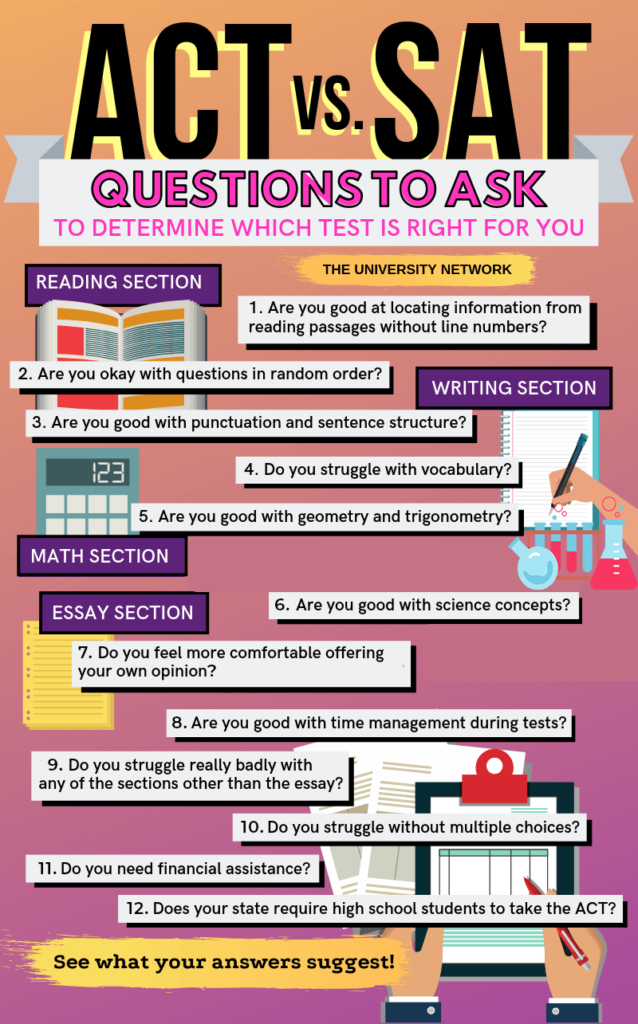The ACT and SAT are standardized tests administered by ACT.org and the College Board, respectively, to gauge your level of college readiness. The ACT is scored on a 1-36 point scale, while the SAT is scored on a 400-1600 point scale.
Although more institutions are adopting test-optional admission policies, millions of students are still taking the SAT and/or ACT.
So, which test should you take?
The collective opinion of most experts is that there is no downright easier test. They test on similar subjects and require about the same amount of preparation time. Both tests are given seven times a year.
Even the numbers show that there is no single test that is exceedingly more popular with students. In the class of 2023, more than 1.9 million students took the SAT while nearly 1.4 million students took the ACT. It is unclear how many students took both, which is a common practice among students. It is unclear how many students took both, which is a common practice among students.
However, if you don’t want to take both exams, there are key differences in content, format and resources that could make one test more preferable than the other. Consider these differences and choose the right test for you.

What are the differences in content between ACT and SAT?
Although the ACT and SAT tests on similar subjects, reading, writing, math and science, the way and the extent each subject is tested differ. So, depending on your personal test-taking strength, one test may seem easier than the other. Ask yourself the following questions and see which test is a better fit for you.
A. Reading section
#1: Are you good at locating information from reading passages without line numbers?
The SAT reading sections have line numbers, which make it easy for you to locate specific information from a passage. The ACT reading sections, however, don’t give line numbers, so it’s not as easy to go back and find specific information from a passage. If you tend to struggle with locating information from passages without line numbers, you might end up wasting a lot of time on simply turning pages back and forth.
#2: Are you okay with questions in random order?
Unlike in the ACT reading sections, questions in the SAT reading sections always flow in chronological order, meaning the order of the passage to which they refer. Even if you’re unsure about a question, you can still guess where in the passage the answer for that question might be hiding by looking at where the question is placed. For example, in the SAT reading section, if you’re unsure about a question that comes second to last, you shouldn’t be looking for an answer in the first paragraph.
B. Writing section
#3: Are you good with punctuation and sentence structure?
While both the ACT and the SAT test grammar in their writing sections, the ACT tends to have more questions on punctuation and sentence structure and the SAT tends to ask more questions on writing style and word/phrase choices.
#4: Do you struggle with vocabulary?
In the Reading and Writing section, the SAT tends to test vocabulary a little more than the ACT.
C. Math section
#5: Are you good with geometry and trigonometry?
To start, the ACT math section covers a wider range of math concepts, with higher focus on geometry and trigonometry than the SAT math section. While geometry and trigonometry make up 35–45 percent and 7 percent on the ACT, respectively, they make up only 10 percent and 5 percent on the SAT.
Also, the ACT tests a few concepts that the SAT doesn’t test at all, such as matrices, graphs of trig functions and logarithms. The SAT math section focuses mostly on algebra.
However, the ACT math section doesn’t give any math formulas, but the SAT math section gives most of the major math formulas. Still, the irony is that all of these math formulas pertain to geometry, which isn’t a big part of the SAT math sections.
D. Science section
#6: Are you good with science concepts?
To be clear, both the ACT and the SAT test on science concepts. Although the SAT doesn’t have an official section called the science section, other SAT sections still require science concepts, such as skills to read graphs and charts. Plus, the ACT science section doesn’t ask for actual scientific facts, such as freezing points or different names of elements on the periodic table.
However, students who struggle with science in general can still feel intimidated by the ACT’s science section for two reasons. First, having the official section called the science section, the ACT tends to use a lot of scientific language and terms. Second, the science section factors into your total score for the ACT. So, if you’re bad at science but are taking the ACT, you’re very likely going to worry about your low science score affecting your total score as well.
E. Essay section
#7: Do you feel comfortable offering your own opinion?
The optional SAT Essay is no longer offered by the College Board unless your state requires it as part of high school graduation.
The optional ACT essay gives you a passage about an issue to read and asks you to analyze different perspectives on this issue. You are asked to give your own opinion on the issue.
What are the differences in format between the ACT and SAT?
Now that we’ve covered the content, let’s see what differences the two tests have in their format.
#8: Are you good with time management during tests?
The SAT takes two hours and 14 minutes, while the ACT without the optional Essay takes two hours, 55 minutes.
The breakdown of the SAT is as follows:
| SAT Sections | No. of Questions | Time Allotted |
| Reading & Writing | 54 | 64 minutes |
| Math | 44 | 70 minutes |
The breakdown of the ACT is as follows:
| ACT Sections | No. of Questions | Time Allotted |
| English | 75 | 45 minutes |
| Mathematics | 60 | 60 minutes |
| Reading | 40 | 35 minutes |
| Science | 40 | 35 minutes |
| Writing (optional) | 1 essay | 40 minutes |
In other words, the ACT gives much less time per question.
To be clear, a strategic test-taker will not allot the same amount of time for each question because it’s smarter to sweep through easy questions and take more time on hard ones. However, the fact that you have more time to answer questions on the SAT might be enough for you to make up your mind on which test to take.
#9: Do you struggle really badly with any of the sections other than the essay?
First, note that the essay section doesn’t really count because it is graded separately in both tests.
Second, since the ACT has four sections factoring into the final score rather than two in the SAT, each section accounts for less in your total score.
For example, let’s say you got a very low score on the math section in both the ACT and the SAT. While that same bad score will account for only one-fourth of your total score on the ACT, it will account for one-half of your total score on the SAT. With the SAT, your bad score has 25 percent (50 percent vs. 25 percent for the ACT) more of an importance to your total score. In other words, your bad math score won’t negatively affect your total score on the ACT as much as it will on the SAT.
Lastly, the same logic goes for the ACT math section, which gives you five possible answer choices instead of four choices given in the SAT math section.
For example, knowing that both tests use rights-only scoring, let’s say you decided to guess on a question. In the SAT math section, you would have a 25-percent chance of getting it right. But in the ACT math section, you would have a 20-percent chance of getting it right. In other words, even though you’re guessing in both tests, the SAT math section gives you a 5 percent higher probability of getting a question correct.
#10: Do you struggle without multiple choices?
The SAT math section contains 13 grid-ins, or student-produced response questions, for which you need to fill in your own answer. In other words, with 22 percent of SAT math questions, you don’t get that minimum 25 percent chance of getting a question correct. However, the ACT only has multiple-choice questions in all four sections.
What are the differences in resources between the ACT and SAT?
By now, you may have already made up your mind. But, there’s one more thing. And it’s big enough to be a game changer for many students. How does each test fare with budget, online resources and more? Let’s find out.
#11: Do you need financial assistance?
As a start, the SAT is $3 cheaper than the ACT without the optional essay. The SAT costs $60 for the test only, while the ACT costs $63 for the test only and $88 with the optional essay included. However, even if you’re struggling financially, this $3 difference may not be enough to choose one test over the other.
To be clear, both tests can be budget-friendly. The ACT and SAT both have a wide variety of free test prep tools online with awesome quality. Also, for students with proven financial need, both tests provide fee waivers that include not only free test registration, but also other resources, such as free score reports to colleges, free prep tools, and even waiver of college application fees at participating schools.
However, after my own research, I found it much easier to find information on the SAT fee waiver than that of the ACT. Unlike the ACT website, the CollegeBoard website is very direct and well designed for first-timers to clearly understand critical information, such as eligibility, other perks, and where and how to register for the fee waiver. Plus, unlike the ACT, the SAT fee waiver covers late registration fees.
#12: Does your state require high school students to take the ACT?
More states are requiring students to take one test over another as a part of their statewide testing regime. In other words, your state is very likely going to provide in-school prep for a specific test.
For example, if you live in Montana, the state not only requires you to take the ACT, but also pays for the test. The SAT would need to have a really reasonable aspect concerning its content or format to look more preferable to you, so that you would spend time studying for it along with the state-required ACT.
To check whether your state requires either one of the tests, click here.
Conclusion
If you’re reading this part of our guide, you’re probably thinking you know which test is better for you. And you may be right. If you answered mostly “Yes” to our questions, the ACT is a better fit. If you answered mostly “No,” the SAT is a better fit. Now, what if you answered half and half?
For those who are stuck in the middle, my last piece of advice for you is to actually take both tests and see them for yourself. Download a free ACT practice test as well as a free SAT practice test and proctor yourself as if it were a real test. Use this conversion tool by PrepScholar to compare both scores. Then, you’ll definitely know which one is right for you.



